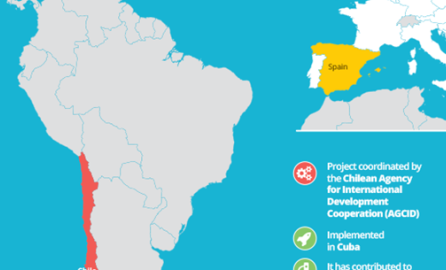Description
To achieve its objectives, the project implemented several key activities:
- Capacity Building and Training: Conducted training sessions for Cuban laboratory technicians and MINAG officials on advanced diagnostic techniques for animal diseases, enhancing their ability to monitor and control health issues affecting food production.
- Infrastructure Improvement: Upgraded laboratory facilities by providing modern equipment, inputs, and reagents to the National Food Hygiene Laboratory, the National Veterinary Diagnostic Laboratory, and the National Laboratory for Avian Research and Diagnosis in Cuba.
- Study Visits and Knowledge Exchange: Organized study visits for Cuban professionals to renowned research centers, such as the IRTA-CReSA Centre for Research in Animal Health in Barcelona, to deepen their understanding of diagnostic techniques and laboratory management.
- Implementation of Diagnostic Techniques: Introduced and standardized advanced diagnostic methods, including the monolayer immunoperoxidase technique (IPMA), to improve the detection and control of animal diseases like classical swine fever.
Cross-Cutting Themes
The project integrates several cross-cutting themes to ensure a comprehensive approach to development:
- Scientific Research and Innovation: By enhancing research capacities and upgrading technological capabilities, the project contributes to advancing scientific knowledge and fostering innovation in the agricultural sector.
- Public Health: Improving the safety and quality of animal-derived food products directly impacts public health outcomes, reducing the risk of foodborne illnesses.
Sustainable Development: Strengthening local capacities and infrastructures supports sustainable agricultural practices, contributing to long-term food security and economic resilience.
Through its comprehensive approach, the project achieved the following outcomes:
- Enhanced availability of safe and nutritious animal-derived food products for the Cuban population.
- Improved animal health standards through effective disease monitoring and control.
- Upgraded laboratory infrastructures equipped with modern diagnostic tools and technologies.
- Strengthened technical capacities of Cuban professionals in animal health diagnostics and food safety.
- Increased collaboration and knowledge exchange between Chilean and Cuban institutions, fostering sustainable partnerships for future initiatives.
Beneficiaries
MINAG officials linked to food security.
Public or private agricultural production units in Cuba.
The whole Cuba's population.
Contribution to the Agenda 2030
This project also sought to increase the availability of safe foods of animal origin and improve animal health levels, in order to improve food security in Cuba. In this way, it contributed to the 2030 Agenda through actions that are framed in SDG 2, but also in 9 and 12. Ensuring access to good quality food, we contribute to the sustainable development of the population of Cuba.
